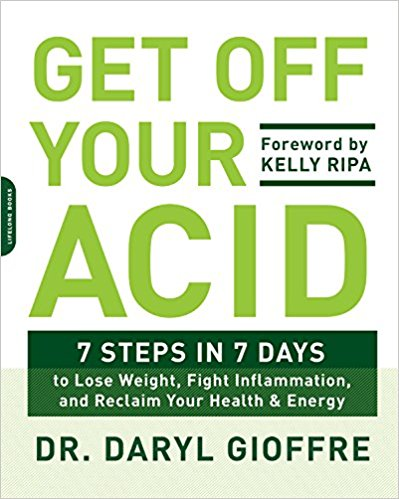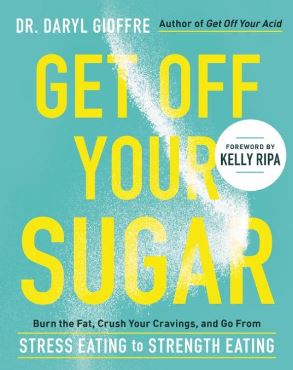
Do you let heartburn and acid reflux stop you from enjoying things you want?
If so, you’re not alone. Whether it’s coffee, citrus fruits, or just lying flat to go to sleep at night, so many people let acid reflux stop them from living life to the fullest.
Did you know that 20 to 30% of Americans experience heartburn each and every week? Even worse, 10% suffer from it every day!
If you’re one of them, and you’ve ever let acid reflux symptoms stop you from enjoying things you love, like sipping that early morning cup of coffee, today’s blog post is for you.
You actually can enjoy coffee, citrus fruits, and so much more if you know how to address the root causes of your heartburn.
I’m going to share what’s actually causing your heartburn, why you need to take action now, and what you can do about it.
What Is Heartburn?
Heartburn is actually just a symptom of a larger problem.
Acid reflux, also known as Gastroesophageal Reflux Disease (GERD) causes symptoms including:
- A burning sensation in the chest (AKA heartburn)
- Indigestion
- Frequent burping
- Bloated feeling
- Nausea or even vomiting
- Difficulty swallowing
- Bad breath
- Abdominal pain
- Tooth decay
Most people think that heartburn and reflux is caused by TOO MUCH acid in your stomach. It’s easy to assume that’s the case because acid creeps up the esophagus. You can literally feel it burning.
On the contrary, reflux is actually caused by TOO LITTLE acid in the stomach (supported by 16,000 research articles). Reflux occurs when a valve called the lower esophageal sphincter (LES) relaxes instead of staying firmly closed. When acid levels are too low, the LES will not close properly.

Now you might be thinking… Dr. D, you always say acid is bad, so why are you saying more acid in the stomach is a good thing?
Fair question. And yes, acid is bad. It’s burn a hole through a jet engine bad! Likewise, foods that are naturally acid-forming in your body like those in the standard American diet are bad.
However, throughout your body, there are some acidic substances that are good and supposed to be that way. Stomach acid is one of those.
That’s why the foods on the list below make your reflux symptoms worse. You want to eat foods that will allow stomach acid to do its job of breaking down foods.
The Top 10 Foods That Make Heartburn Worse
When you eat these offending foods, it leads to: 1) less stomach acid to break down your food and kill off the bad bacteria in your digestive tract; and 2) a malfunctioning LES valve, which is why you experience acid reflux symptoms.
So as you read the list below, I recommend you take note of any you eat regularly, and then keep track of your symptoms. Symptom tracking for reflux can be very effective if you use it as a way to determine which foods to eliminate, but keep in mind that some foods can exacerbate symptoms for 48 hours or more, so eliminate foods for a few weeks before reintroducing to be sure.
- Sugar – Chocolate is a known offender, but cookies, donuts, and other sweets also cause reflux symptoms for many people. And by the way, artificial sweeteners are no better. So if you’re looking for alternatives, lo han berry extract(AKA monk fruit) or organic stevia are your best options.
- Processed foods – Foods made from corn, potatoes, wheat, and sodium chloride (table salt) can trigger heartburn in some patients with GERD. It’s not entirely clear why these foods cause reflux, although I would argue that it’s no coincidence that those are all acidic foods, but studies have shown that diets high in processed salt (not mineral salts) increase the likelihood of developing GERD.
- Refined oils – Beware of salad dressings, mayonnaise, and anything containing vegetable oils, canola oil, or soybean oil, which are pro-inflammatory omega-6 fatty acids, which are hard for the stomach to break down. Olive oil is a better alternative.
- Fruit juices – Although it’s generally thought that citrus juices like orange juice and lemonade cause reflux, other juices such as cranberry and apple have the same effect. Why? They’re all acidic and full of sugar, which exacerbates symptoms.

One interesting thing to know, though, is that lemon juice is not bad for all people with reflux. What happens if you were to put lemon juice on a cut? The ACID would burn…Well, the same happens if the inflammation, irritation, and ulceration from reflux is bad enough, then you can feel the burn. But if it’s not at that point yet, then you could benefit from lemon in your water, on your salads, etc.
- Fried foods – Heavy foods are tough on the stomach to break down, which leads to gastric distension, which means increased pressure on the sphincter at the top of the stomach to open, letting acid into the esophagus.
- Processed meats – Research indicates that ground beef, chicken nuggets, chicken wings, and other processed cuts of meat all trigger heartburn.
- Dairy products – Patients complain that sour cream, cheeses, ice cream, and cottage cheese make their GERD worse. Most likely, this is because they are all high in unhealthy animal-based fats and difficult to break down. They also are high in the sugar lactose, which turns to lactic acid.
- Coffee or any caffeine – It’s widely known that coffee and espresso drinks irritate the upper GI tract, but did you know that any caffeinated beverages can have the same effect, including energy drinks, tea, and soda? They irritate the esophagus and can allow more stomach acid to creep upward. Keep reading for what to do about this…
- Alcohol – I recommend anyone suffering from reflux should stop drinking any alcohol for a few weeks. Then, if you reintroduce the occasional beverage, notice the effect it has on your reflux over the following 48 hours. Again, the symptoms are not always immediate.
- Carbonated water – Any carbonated drink, including sparkling water or seltzer, causes gastric distension, which lets acid into the esophagus.
Why You Can’t Ignore Heartburn
Heartburn and other symptoms of GERD are like a check engine light coming on in your car. You cannot ignore what they are trying to tell you.
I know this all too well, unfortunately. A few years ago, we lost my dad to esophageal cancer.

Do you know what one of the biggest warning signs for esophageal cancer is? Chronic heartburn and acid reflux. And the best chance for a good outcome is catching it early and nipping this problem in the bud.
So I urge you to take this seriously. It might seem like a little nuisance or pain, but it could be a warning of much bigger problems down the road.
The 5 Supplements That Put an End to Heartburn
I’ve helped hundreds of patients with heartburn and other GERD symptoms over the years in my wellness clinic, and I’ll give you the same set of supplements I recommend to them, in addition to avoiding the foods above.
This combination – the right nutrients to correct the problems in the esophagus and stomach along with fewer trigger foods – will make an enormous difference in your symptoms and put you on a path to lifelong digestive health.
1. Minerals

The first thing you need to add is a high-quality mineral supplement. This is going to calm the reflux symptoms and keep acid in the stomach, where it belongs. It will actually help the LES valve function properly, as well as improve breakdown of the trigger foods on the list above.
So 30 minutes before bed, add a scoop of Acid-Kicking Minerals to water so that your can sleep better – and lay flat without symptoms.
By ending your day with Acid-Kicking Minerals every night, you’re ensuring that you get enough magnesium, as well as the right balance of calcium, potassium, and sodium bicarbonate, all from quality sources unlike most other supplements to fight acid as you sleep.
2. Anti-Inflammatory
Next, you want to reduce the inflammation that’s taking place along the esophagus that is caused by and contributing to GERD. A lot of people take turmeric for this purpose, but we’ve got something 3 times stronger.

Acid-Kicking Black Seed Oil is the most powerful natural anti-inflammatory available with 3 times more inflammation-fighting power than other black seed oils (3% thymoquinone) and 1,000 times more active antioxidants than vitamin E or Echinacea.
3.Probiotics
Because reflux stems in part from an imbalance of bacteria in your gut, add in a good probiotic supplement. Always buy the refrigerated brands – they are higher quality and refrigeration keeps the optimal number of bacteria alive so they can get into your stomach and fight the bad bacteria.
4. B Vitamins
Folate, also known as vitamin B9 or folic acid and other B vitamins have been shown in clinical studies to prevent acid reflux, just as deficiency of vitamins B2 and B6 are linked to an increased risk of acid reflux. Make sure to eat B9 rich foods like asparagus, spinach, okra, and beans too.
5. Coffee Alkalizer
This is what I promised at the beginning of this article.
It IS possible to drink coffee without the heartburn and other GERD symptoms it often causes.
We created Acid-Kicking Coffee Alkalizer, a powder supplement that delivers plant-based, clean keto fats, acid-fighting minerals, pure Himalayan pink mineral salts, and enzymes to optimize brain-boosting energy, suppress hunger, and burn body fat throughout your day.
It actually changes the pH of your coffee from acidic to alkaline! Watch this video to see it happen.
Did you know we’ve created NEW fall flavors of our Coffee Alkalizer? In addition to our 3 creamy and slightly sweet flavors – Salted Caramel, Mocha, and Vanilla – you can now get it in PUMPKIN SPICE! But only for a limited time.
If you want a flavorless version, we also offer Black for all of you black coffee lovers.
Try it today or Subscribe & Save 15%!
GET OFF YOUR ACID!
Dr. Daryl
 Skip to content
Skip to content








